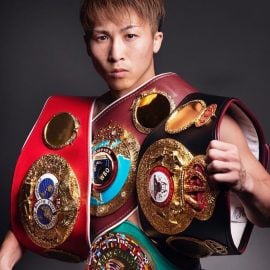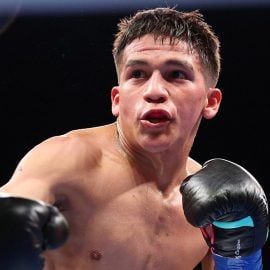Best I Faced: Felix Sturm
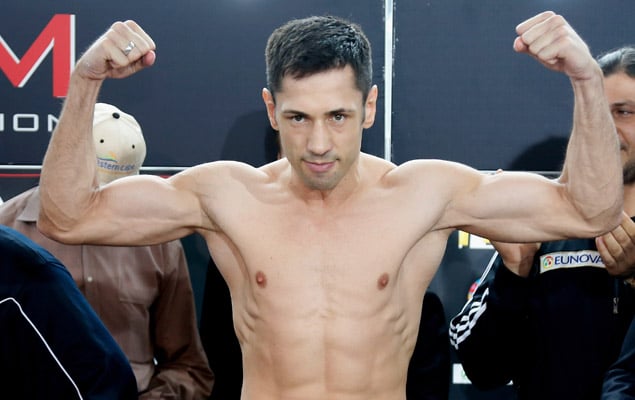
Skilled technical boxer Felix Sturm was a mainstay in the middleweight division for over a decade, winning three versions of the 160-pound title before stepping up to super middleweight to become a two-weight titleholder.
Sturm’s parents emigrated from Bosnia and Herzegovina to Germany in the early 1970s. Sturm, whose birthname is Adnan Catic, was their only child and was born in the small city of Leverkusen, Germany on January 31, 1979.
When Sturm was 11 he took up boxing and it quickly became the focal point in his life.
“The best part about Leverkusen was the boxing school,” Sturm told The Ring. “My old trainer learned boxing in Cuba. I learned so much from this old trainer.
“I trained nearly every day after school, from 5 p.m. until 8:30. Nearly every weekend we were in a fight. I never had time to do stupid things. I was never interested in smoking, alcohol, or party. For me, it was only boxing… focus on boxing.”
Sturm excelled as an amateur. He was the European junior champion in 1997 and as a senior claimed the top prize at the 2000 European championships. In between he won two German national titles and fought at the 1999 World Championships before appearing at the 2000 Sydney Olympics.
“The Olympics are special,” said Sturm. “I lost to [future undisputed middleweight titleholder] Jermain [Taylor in the quarter-finals]. No matter, it was a great experience. It doesn’t matter if you are a boxer or in another sport, it’s a big dream to go to the Olympic games.”
Sturm, who had 186 amateur fights, winning approximately 175 of them, turned professional in early 2001.
The young fighter’s career moved smoothly and following 18 straight wins, he was offered a life-changing opportunity. Bert Schenk was injured just 10 days before his WBO middleweight title challenge against Hector Javier Velazco.
Sturm immediately stepped in to fill the void.
“On the Monday before the fight they informed me that I can fight for the middleweight title,” he recalled. “They asked me if I’m ready and I said, ‘Yes.’ I had just three weeks preparation.
“The guy was tough. It was a great fight and in the last two rounds I just tried to survive, but it was my first world championship. It was a little bit strange because you prepare for an eight-round fight and then you fight a world championship fight – it’s like a dream. It was a big chance, and I won the world title (via 12-round split decision).”
After one title defense he was offered the opportunity to face the then five-weight world champion and boxing legend Oscar De La Hoya in June 2004.
“At that time he was the biggest star in boxing,” acknowledged Sturm, who acquitted himself extremely well but dropped a highly controversial 12-round unanimous decision.
“This was build up for a fight with [Bernard] Hopkins [for the undisputed middleweight championship.] De La Hoya thought it was an easy fight for him because I was a young kid.
“I came to Las Vegas to win, to show the people I’m prepared for big fights. It’s still my biggest and best fight. It was a pleasure to fight in Las Vegas and share the ring with Oscar. For me, inside and outside the ring, it was a great experience.”
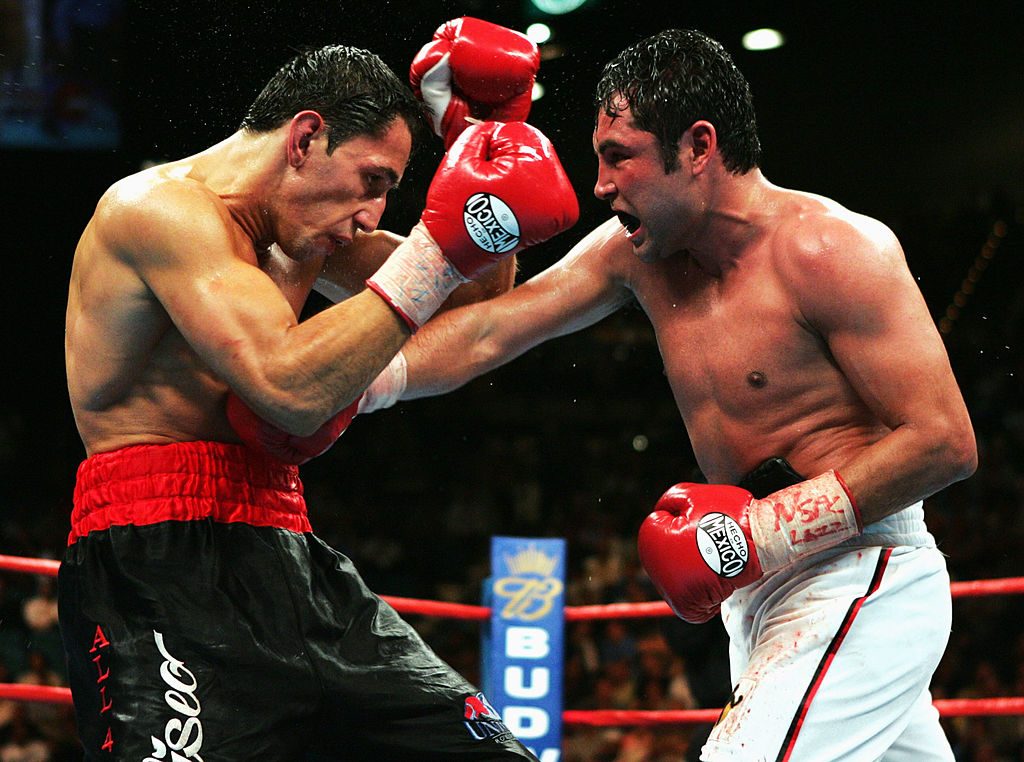
Sturm (left) lost the WBO middleweight title to Oscar De La Hoya. Photo by Jed Jacobsohn/ Getty Images)
Unperturbed by the setback, Sturm harnessed that experience to win four fights before relieving Maselino Masoe of his WBA 160-pound title via 12-round unanimous decision in March 2006.
Sturm was on course to retain his title for the first time against former WBC junior middleweight titlist Javier Castillejo when the wily Spanish veteran came from behind to stop him in Hamburg, Germany in July 2006.
But the former champ used this second career defeat to galvanize himself and rebounded to best Castillejo in a rematch.
“When he beat me it was my fault,” explained Sturm. “After the first round I thought it would be an easy job. In the second round I was on the floor. It was my first and only time [that I was] knocked down and then I lost by TKO [in Round 10.] Javier was a very good fighter – a very tough, experienced fighter. He was a very strong guy, he was smart and a power puncher, difficult to fight.
“It was a good experience, sometimes a loss is worth more than a win. I’m thankful for this fight and thanks to God, I won the rematch and became a three-time world champion.”
Having regained his championship, Sturm went on to make 12 successful defenses against the likes of future IBF beltholder Sebastian Sylvester (UD 12), Matthew Macklin (SD 12) and Martin Murray (D 12).
When Sturm looks back on the fights with his British challengers, Macklin and Murray, he knows they could have gone against him.
“The Macklin fight was close,” he acknowledged. “I won – and I’m honest – because the fight was in Germany. Probably in England I would lose that fight.
“The Murray fight, it was a close fight, but I won the rounds with cleaner shots. It was a little bit strange that it was a draw but it is OK.”
Sturm attempted to unify with IBF titlist Daniel Geale but lost a 12-round split decision in Oberhausen, Germany in September 2012.
“It was a close fight but I lost,” admitted Sturm. “I was very disappointed because we had a great training camp and great preparation. [But] two weeks before the fight I had some problems. I didn’t want to turn down the fight. I [thought], ‘I can beat him ill.’ It was a great performance by Daniel.”
After two fights, Sturm claimed the IBF title when he beat Darren Barker on an injury before surprisingly losing the belt to Sam Soliman in May 2014.
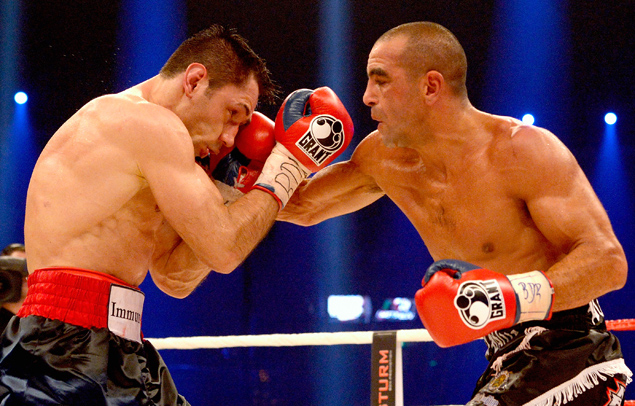
Sturm (left) mixes it up with Sam Soliman.
During his championship tenure Sturm was criticized in some quarters for not facing Gennadiy Golovkin.
“I like his style, but there were bigger and better fights for me,” he said. “I had different plans. It was different for him to be a star in Germany and that’s why he went to the U.S. and became a big star and a great fighter.”
Sturm elected to move up to super middleweight, where he fought Robert Stieglitz to a draw. He initially lost to WBA 168-pound beltholder Fedor Chudinov but won the rematch.
“The second fight I won on points and became a five-time world champion,” Sturm said proudly. “It was something great for me and a day that I will never forget. Every single title win was something special. To come back after a loss is always something special. Every loss is motivation and I came back stronger.”
The German encountered some out the ring issues which meant he didn’t fight for almost five years.
“I was nine-months in jail for tax evasion,” Sturm said openly. “Today I’m much smarter. I have a very, very good lawyer. In the past there was some problems with my tax advisor. They arrested me for millions but it was one million. I was nine months in jail. At the end of the day, what happened, happened and I learned from that. Now everything is good. I don’t look back, I only look forward.”
Since leaving prison, Sturm has resumed his boxing career with two wins and isn’t done yet.
“I’m just going fight to fight,” explained Sturm (42-5-3, 18 knockouts). “I’m 30 years in boxing. Hopefully everything will be fine and there will be three or four more fights, then I will step back for the younger generation. I’m like the last warrior here in Germany.”
Sturm, 42, is married and has two children. He lives in Koln and has business interests.
He graciously took time to speak to The Ring about the best he faced in 10 key categories.
BEST JAB
Oscar De La Hoya: I was always the guy with the best jab. [Out of my opponents] I would say Oscar. He threw a lot of combinations and he prepared everything with the jab.
BEST DEFENSE
Maselino Masoe: He was a dangerous power-puncher with his left hook and right hand, and he also had a very good defense. It was tough because he was dangerous. He was small for a middleweight and that also makes it tough to land a clean punch.
BEST HANDSPEED
De La Hoya: My handspeed is very good, I’m fast, but his speed was really fast. You had to put him under pressure to take control of his speed and power. That was the key to beat Oscar De La Hoya. He needs pressure from the outside, from distance, not inside. His speed was very good, he was very, very fast.
BEST FOOTWORK
De La Hoya: Masoe was good. Oscar of course.
SMARTEST
De La Hoya: Oscar was clever. From the ring IQ, I would say Oscar.
STRONGEST
Robert Stieglitz: Stieglitz was physically strong; it was my first fight at 168. He tried to put pressure on. His problem was he didn’t like to fight a guy who boxed, who moved and used his jab.
BEST CHIN
Stieglitz: He took a lot of good punches.
BEST PUNCHER
Masoe: I never felt power like Masoe. His power was like a train. He was very dangerous. One time, he landed a left hook in the second or third round – I didn’t want any more. I fought from the outside.
BEST BOXING SKILLS
De La Hoya: Oscar was special with his boxing skills. Everything was good: his speed, combination, power punches, everything.
BEST OVERALL
De La Hoya: He was an Olympic gold medalist, he had a lot of experience. It was my first big fight, my second title defense. He had fought so many great fighters. He had great trainers. Like I said, his jab, his speed, his power punches, his movement; that makes him a special fighter. When you put it all together, that makes him nearly a complete fighter.
Questions and/or comments can be sent to Anson at [email protected] and you can follow him on Twitter @AnsonWainwright
SUBSCRIBE NOW (CLICK HERE - JUST $1.99 PER MONTH) TO READ THE LATEST ISSUE







